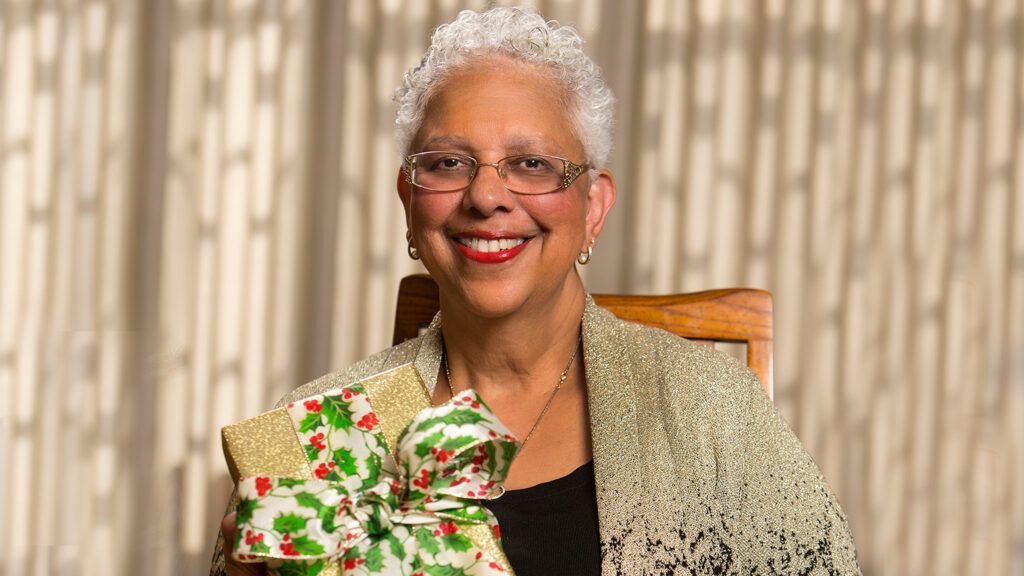Have you ever been a part of something that made no sense to you at the time but turned out to be an unforgettable life lesson? That Christmas I didn’t understand what was happening. I didn’t really put it all together for some time, but what I learned about myself—and Mr. P—is a lesson I’ll never forget.
My Christmas to-do list that year was overwhelming. Nailing down last-minute details threatened to draw all the holiday spirit out of me. Still, the one thing that always made the mad rush bearable was my shoe boxes.
It was a tradition I’d started in memory of a dear cousin, the very first recipient of one of those boxes. Each year I’d look for 10 people, folks who were in nursing homes or had lost a loved one or just seemed lonely or in need. I’d fill a shoe box with little gifts—lotion, deodorant, toothpaste, socks, lip balm, soap and tissues. I’d tape 20 one-dollar bills end to end and roll them up tightly into a tube and for fun, I’d throw in a windup dollar-store toy.
After wrapping each of the gifts in leftover wrapping paper, I’d put them in the box and top it off with a handwritten note, “Always remember, God loves you.” I never signed my name. That was part of the satisfaction. The hidden joy.
By Christmas Eve that year, I had only five boxes left to hand out. I knew exactly who would get them—five older members of St. Margaret’s. I rushed to the parish hall just before the 7:30 p.m. service. The holiday reception was winding down. I spotted four of my intended gift recipients in the hall. The fifth was nowhere to be seen. Maybe that person would show up soon.
I needed someone to be Santa’s helper. Right then, I spotted my friend Jim, our church’s senior warden and a former college football player. At his size, he can seem intimidating at first, but he’s really a gentle giant. I sidled up to him. “Can you keep a secret?” I asked.
“Sure,” he said. I explained what I wanted him to do. We went to the hallway, where I slipped him the four shoe boxes. I stashed the last in a corner. Then I made small talk with some friends and watched out of the corner of my eye while Jim made his way around the room. Each time he stopped, there’d be a look of surprise. “What? For me? Who’s it from?” “Why, Santa, of course,” Jim would say with a chuckle. Soon everyone was laughing and enjoying themselves.
Everyone except Mr. P.
I hate to say it, but Mr. P was one of the most difficult people I have ever met. Ornery and persnickety were some of the nicer words people used to describe him. He was sitting by himself at the refreshment table, dressed in a red flannel shirt and tan slacks with suspenders.
He’d done quite well in business—he drove a hard bargain, folks said—but he was much less adept when it came to relating to others. In small groups at church, if the leader wasn’t assertive enough, Mr. P would hijack the discussion, stringing sentences together on whatever interested him without seeming to pause for breath. If someone wrestled the conversation back to the proposed topic, he would interrupt and continue trying everybody’s patience.
I had little tolerance for him and was only too glad when he started going to the earlier Sunday service. I went to the late one. I didn’t have to see him. And I hadn’t. Not until now. There he was, sipping eggnog. People were polite, pausing to say hello, but nobody wanted to sit next to him and get sucked into a conversation.
The service would start soon. I went to pick up the last shoe box. It looked as if the person I had intended to give it to wouldn’t be showing up. What would I do with it? A voice inside my head had a suggestion: Give the box to Mr. P.
There were a thousand reasons why Mr. P did not deserve this present. He wasn’t needy or in a nursing home. He didn’t seem lonely. Not at all. To hear him tell it, he was never lonely because he was such good company for himself.
Give…the…shoe box…to…Mr. P, my inner voice insisted. No way! I responded emphatically. Giving him the box would be absurd. Finally I put the box away in the cloakroom along with my coat and went into the sanctuary for the service.
Everything was beautiful, with the scent of fresh pine boughs, candles flickering, the altar transformed by a sea of poinsettias. I took a seat in a pew near the middle, just before the choir processed in, singing carols. The feeling of Christmas seemed so near! All of the stress of the season faded in the tidings of joy. But I couldn’t stop looking at Mr. P, who was sitting several pews ahead of me. Though people were sitting on either side of him, he seemed so isolated, so utterly alone. Maybe my inner voice knew something I did not.
All right, I told myself. I’ll do it.
We reached the portion of the service where we stood and greeted one another in peace. I slipped out of my pew and asked Jim if he would agree to play Santa’s elf one more time. “I’d like to give that last box to Mr. P,” I whispered.
“No problem,” Jim said. “His son is coming to pick him up. I’ll give the gift to him when I walk him to the car.”
“Don’t you dare tell him who it came from,” I said. “Just say it was Santa.” Back in the cloakroom, I fetched the shoe box and handed it to Jim. I enjoyed the rest of the service and didn’t give Mr. P another thought.
Later that winter, I heard some news about Mr. P. His health had declined, forcing him to move in with his son. Soon he was telling anyone who would listen how unhappy he was with the arrangement. Another Christmas came and went, and then Mr. P and his son seemed to disappear. That spring, I learned that Mr. P had died in Florida, where his son had moved for a job.
The next Sunday, Jim and I talked about Mr. P. “You know I had to tell him that you were the one who gave him that box,” he admitted, somewhat sheepishly. “He wouldn’t accept any other answer. You know how he was.”
It took me a second to remember what Jim was talking about. “Of course,” I finally said. “The shoe box.”
“Mr. P wanted to thank you in person,” he continued, “but he never ran into you. He said no one had ever given him something without expecting anything in return. That’s the way it was in business and life. He kept asking, ‘Why did she do that for me? I need to know why.’ I didn’t know what to tell him.”
I struggled to come up with an answer, recalling that Christmas Eve night, the ill will I’d felt toward Mr. P.
“I didn’t want to give him the shoe box at first,” I said. “I thought he didn’t deserve it. I thought there must be someone worthier.”
Then it dawned on me. I hadn’t given the shoe box to Mr. P at all. God had, over my initial objections. I’d finally complied because I had to give the box to somebody. It was God who gave the gift to Mr. P. I just delivered it.
Mr. P has been gone for several years now, and strange as it might seem, I miss him. I often think of him when I assemble my Christmas shoe boxes. I’m reminded of how people can be like gaily wrapped presents; what’s inside can’t always be deciphered. Their hearts, their minds, their needs can be a mystery to us. But sometimes we’re given a glimpse of just what God sees, what we are blinded to. Sometimes God uses us to help him love the people we think are unlovable. Like Mr. P, who needed a gift that Christmas more than anyone.
Read More: Five Benefits of Being a Cheerful Giver
For more inspiring stories, subscribe to Guideposts magazine.




